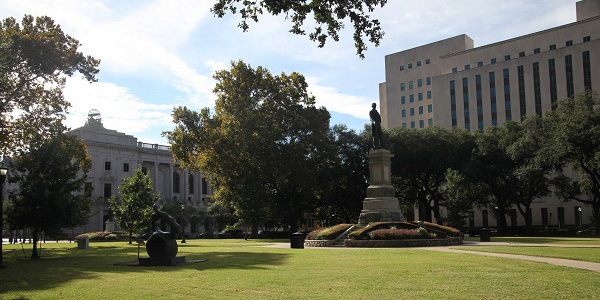A Texas law giving incumbent transmission companies the right of first refusal to build new power lines in the state will likely survive another round of judicial review, according to one energy analyst.
The 5th U.S. Circuit Court of Appeals last week heard oral arguments in NextEra Energy’s effort to repeal the 2019 law but is not expected to rule on the matter for several months (20-50160).
NextEra Energy Capital Holdings, on behalf of four other NextEra transmission owner/developer entities, appealed a U.S. district court’s February decision to not overturn Texas Senate Bill 1938. (See NextEra Appeals Court Decision on Texas ROFR Law.)
The law essentially allows only incumbent transmission companies to build new power lines in Texas by granting regulatory certificates of convenience and necessity to the owners of the endpoints of a new transmission line. NextEra has alleged the law imposes burdens on interstate commerce by restricting entry into Texas’ transmission market, “outweighing any local benefits.”
ClearView Energy Partners, a D.C.-based independent energy policy research firm, said in a letter to its clients that it believes oral arguments during the June 1 hearing provide SB 1938’s proponents a reason to be optimistic.
The firm said Judge Jennifer Elrod appeared “skeptical” of NextEra’s standing and the “ripeness of the appeal.” Judge Gregg Costa “appeared at times to share” that view, it said.
“Judge Costa, however, did offer the view that Texas was not just establishing a right of first refusal … akin to a Minnesota law recently upheld by the 8th Circuit, but rather an outright ban,” the firm said.
Costa was referring to a similar case in Minnesota before the 8th U.S. Circuit Court of Appeals. (See Justice Dept. Joins Challenge to Minn. ROFR Law and Courts Uphold Minn. ROFR, MISO Cost Allocation.)
ClearView also said it considers the upcoming decision to be a “potential indicator of whether other states may see low judicial risk if they consider similar laws.”
“The 5th Circuit’s ruling could provide additional clarity of how the courts are interpreting the limits the dormant Commerce Clause imposes on states that create in-state preferences or requirements, an issue that has raised judicial risk in the past for state renewable power mandates,” the firm said.
NextEra is appealing the decision because it says NextEra Energy Transmission (NEET) Midwest could lose its “lawfully won right” to build the $115 million Hartburg-Sabine Junction transmission project in MISO’s East Texas footprint. It says SB 1938 “substantially impaired” NextEra’s reasonable contractual expectation to obtain a CCN from the Texas Public Utility Commission, as required by NEET Midwest’s agreement with MISO.
NEET Midwest won the project’s rights in 2018 through a competitive bidding process. (See NextEra Wins Bid to Build MISO’s 2nd Competitive Project.)
The legislation also affects NEET Southwest’s application with the PUC, the appeal’s defendants, to transfer ownership of 30 miles of 138-kV facilities from Rayburn Country Electric Cooperative in SPP’s region of East Texas.







